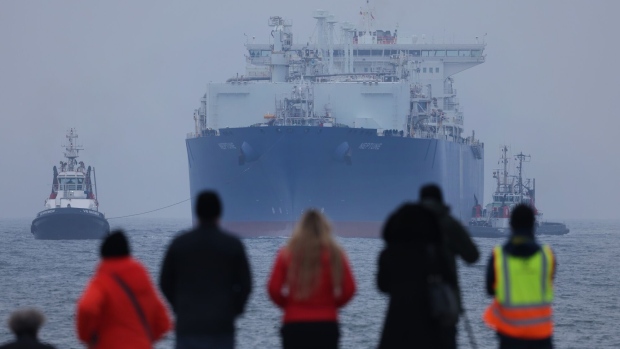Feb 25, 2024
Germany’s Mukran Baltic Sea LNG Terminal Starts Trial Operations
, Bloomberg News

(Bloomberg) -- A controversial liquefied natural gas terminal on Germany’s Baltic Sea island of Rügen began trial operations Saturday, according to operating company Deutsche ReGas.
The regasification vessel Energos Power arrived at the industrial port of Mukran earlier in the day, after state authorities granted approval for early commencement of operations, the company said in a statement. The ship, the first of two regasification vessels planned for the terminal, is carrying LNG from Norway, ReGas said.
It’s a step forward for Germany, Europe’s largest economy, as it seeks to rebuild its energy security following an unprecedented energy crisis in the wake of Russia’s invasion of Ukraine two years ago. Europe has relied heavily on LNG to fill in the gap after Russia curbed most pipeline supplies.
However, works on the terminal and connecting pipelines have been challenged by environmental groups and local opposition on Rügen island, a popular tourist destination and home to protected seabirds.
Natural gas from Mukran will be fed into the German gas pipeline network “this winter,” ReGas supervisory board chairman Stephan Knabe said.
“This will secure Germany’s energy independence and the production capacity of many companies,” said Carsten Schneider, a lawmaker from Chancellor Olaf Scholz’ Social Democratic Party and special government commissioner for eastern Germany. “The fact that the terminal could be built and the necessary pipelines laid within just a few months is proof of Germany’s new pace and should set an example for other infrastructure projects.”
Read More: Germany Wants to Become LNG Hub to Supply European Neighbors
The aim of the trial operation is to test and commission all shore- and ship-based systems, according to ReGas. The LNG regasification vessel Neptune will leave the port of Lubmin in the spring of this year as planned and commence operations in Mukran in the summer, after refitting work, it said.
--With assistance from Michael Nienaber and Petra Sorge.
©2024 Bloomberg L.P.





